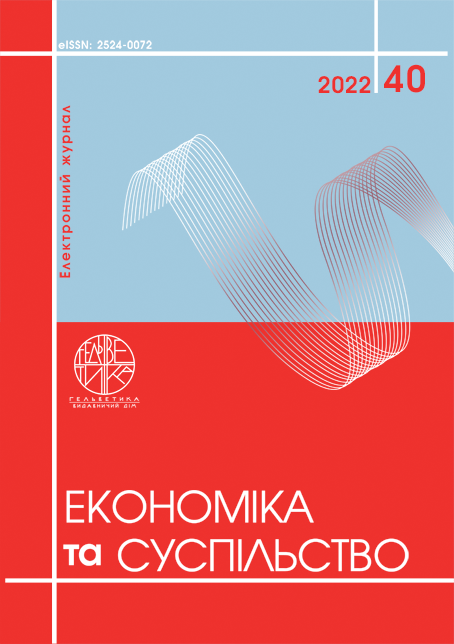EUROPEAN EXPERIENCE IN PROMOTING YOUTH EMPLOYMENT
Abstract
The article is devoted to topical issues of promoting the employment of graduates of higher education institutions in Ukraine. The relevance of this topic is due to the fact that young people with higher education after graduation face certain difficulties related to employment in the first workplace. The problems of career guidance, job search, and employment are caused by many factors, including the mismatch of graduates' competencies with the needs of the labor market, insufficient awareness of young people about job search technologies, lack of social skills, insufficient information about opportunities to gain professional experience, and others. It has been established that the problem of employment of graduates of higher educational institutions has a pan-European character. In Ukraine, the mentioned problem is even more acute, as it is complicated by the challenges of martial law. The article highlights the best practices of EU countries, which are used to support young people in the transition from education to work. In particular, the experience of France, Slovenia, Italy, Austria, Denmark, Belgium, Finland, Croatia and others was studied. Their common features are singled out and summarized, in particular, the program method, complexity and flexibility combined with individualization of services, broad partnership, co-financing, etc. Based on the generalization of the progressive European experience, the main directions of activation of measures to improve the employment of young people with higher education and their consolidation in the domestic labor market are outlined. One of the urgent directions for improving employment in Ukraine should be the development of comprehensive state and regional programs to support the transition of youth from education to the labor market. An important role in this connection is assigned to higher educational institutions, since the competitiveness of specialists depends in many respects on their balanced interaction with the labor market, the compliance of their competences with the modern requirements of employers, and therefore, their rapid transition from education to the labor market.
References
Erabaddage G., Shukri M., Khatibi A. (2015). Review of Literature on Graduate Employability. Journal of Studies in Education. Vol. 5 (3). URL: https://www.researchgate.net/publication/281926484_Review_of_literature_on_Graduate_Employability (дата звернення: 10.06.2022).
Nilson S. (2010) Enhancing individual imployability. The perspective of Enginireeng graduates. Education & Training, 52(6 7), 540–551.
Francis Green & Golo Henseke (2021) Journal for Labour Market Research Volume 55, Article number: 2. URL: https://cutt.ly/TJ3LJJI (дата звернення: 1.06.2022).
Thi Tuyet Tran (2019) Graduate employability. Innovate Higher Education to Enhance Graduate Employability. p. 158–168. URL: https://cutt.ly/4J3Z2sa (дата звернення: 1.05.2022).
Shelagh Green, Sergi Martínez-Rigol, Stefania Mellera, Julia Pion Da Rocha Paranhos (2021) Career services in times of COVID-19. URL: https://cutt.ly/ZJ3Mg9Y (дата звернення: 1.05.2022).
Колот А.М. До формування нової моделі соціальної держави. Україна: аспекти праці. 2017. № 1. С. 3–15.
Мосьпан Н.В. Досвід ЄС щодо забезпечення працевлаштуванням випускників з вищою освітою. Вісник Чернігівського національного педагогічного університету. Серія: Педагогічні науки. 2019. Вип. 5 (161). С. 153–157.
Самойлик Ю.В. Закордонний досвід дослідження державного управління сферою освітніх послуг. Економіка та суспільство. 2021. Випуск № 25. DOI: https://doi.org/10.32782/2524-0072/2021-25-88 (дата звернення: 10.06.2022).
Махсма М.Б., Чуб О.В. Активна політика зайнятості молоді України. Бізнес Інформ. 2022. № 1. С. 238–244.
Стратегія розвитку вищої освіти в Україні на 2021–2031 роки. URL: https://cutt.ly/fJ3SB82 (дата звернення: 10.06.2022).
Salzburg II – Recommendations – 2010. URL: https://eua.eu/resources/publications/615:salzburg-ii-%E2%80%93-recommendations.html. (дата звернення: 1.05.2022).
European semester thematic factsheet youth employment (2016). URL: https://cutt.ly/1J30y9f. (дата звернення: 10.06.2022).
Erabaddage G., Shukri M., Khatibi A. (2015) Review of Literature on Graduate Employability. Journal of Studies in Education. Vol. 5 (3). Available at: https://www.researchgate.net/publication/281926484_Review_of_literature_on_Graduate_Employability (accessed: June 10, 2022).
Nilson S. (2010) Enhancing individual imployability. The perspective of Enginireeng graduates. Education & Training, 52(6 7), 540–551.
Francis Green & Golo Henseke (2021) Journal for Labour Market Research Volume 55, Article number: 2. Available at: https://cutt.ly/TJ3LJJI (accessed: June 10, 2022).
Thi Tuyet Tran (2019) Graduate employability. Innovate Higher Education to Enhance Graduate Employability. p. 158–168. Available at: https://cutt.ly/4J3Z2sa (accessed: May 5, 2022).
Shelagh Green, Sergi Martínez-Rigol, Stefania Mellera, Julia Pion Da Rocha Paranhos. (2021). Career services in times of COVID-19. Available at: https://cutt.ly/ZJ3Mg9Y (accessed: May 5, 2022).
Kolot A.M. (2017) Do formuvannya novoyi modeli social`noyi derzhavy` [To the formation of a new model of the welfare state]. Ukraine: aspects of work, no 1, pp. 3–15.
Mospan N.V. (2019) Dosvid YeS shhodo zabezpechennya pracevlashtuvannyam vypusknykiv z vyshhoyu osvitoyu [EU experience in providing employment to graduates with higher education]. Bulletin of the Chernihiv National Pedagogical University, Seriya: Pedagogichni nauky, no 5 (161), pp. 153–157.
Samojlyk Yu.V. (2021) Zakordonnyj dosvid doslidzhennya derzhavnogo upravlinnya sferoyu osvitnix poslug [Foreign experience of researching state management in the field of educational services]. Economy and society, no 25. DOI: https://doi.org/10.32782/2524-0072/2021-25-88 (accessed: June 10, 2022).
Maxsma M.B., Chub O.V. (2022) Aktyvna polityka zajnyatosti molodi Ukrayiny [Active youth employment policy of Ukraine]. Business Inform, no 1, pp. 238–244.
Strategiya rozvytku vyshhoyi osvity v Ukrayini na 2021–2031 roky [Strategy for the development of higher education in Ukraine for 2021–2031]. Available at: https://cutt.ly/fJ3SB82 (accessed: June 10, 2022).
Salzburg II – Recommendations – 2010. Available at: https://eua.eu/resources/publications/615:salzburg-ii-%E2%80%93-recommendations.html (accessed: June 10, 2022).
European semester thematic factsheet youth employment. (2016). Available at: https://cutt.ly/1J30y9f (accessed: June 10, 2022).


